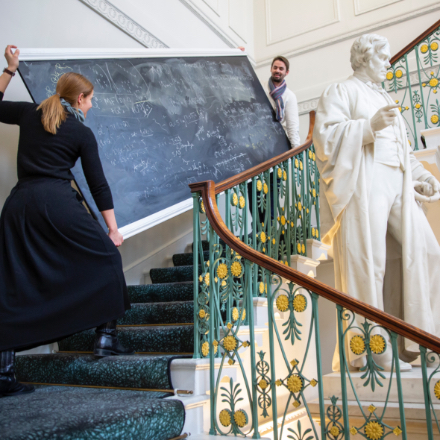The London Institute moves to the Royal Institution
23 FEB 2021
The London Institute has moved into the Royal Institution, the world’s most prestigious scientific building, where it will expand its programme of curiosity-driven research.
The London Institute has moved into the world’s most prestigious scientific building. It was at the Royal Institution in Mayfair that Sir Humphry Davy carried out research leading to the discovery of nine new chemical elements. It was here, too, that Michael Faraday identified the principles of electricity. This tradition of scientific excellence continued into the 20th century, with researchers at the RI going on to win 15 Nobel prizes. It is into rooms that were once Faraday’s private apartments that the London Institute has now moved its blackboards.
Until now, the Institute was based in an 18th-century Grade II* listed townhouse, just a ten minute walk away in Mayfair. Since becoming an Independent Research Organisation in 2019, it has been on the look-out for a place to expand, and it was invited to move to the RI in early 2021.
The RI’s magnificent Grade I listed home at 21 Albemarle Street boasts a facade by Lewis Vulliamy. It houses the Davy Faraday Research Laboratory and the iconic Lecture Theatre, where Michael Faraday established the Christmas Lectures. The RI’s historic public rooms, including the Theatre, will enable the London Institute to invite a wider audience to its events and talks.
When the RI was founded in 1799, at first it focused more on science communication than research. To this day, it leads the world in science engagement, which it carries out through the events it holds in its Theatre, its educational programmes and its popular social media and Youtube channels. The London Institute will benefit from the RI’s reach and expertise, as we continue to share our discoveries with the scientists and businesses that can build on and apply them.
“I am delighted to welcome the London Institute for Mathematical Sciences to the Royal Institution,” says the RI’s Director, Lucinda Hunt. “Like us, they recognise the importance of engaging the public with new scientific discoveries. Their curiosity-driven approach to research aligns with our charitable objectives to support science in schools and at home, encouraging a spirit of critical thinking and exploration. I look forward to them adding a new chapter to the rich history of scientific research at the RI.”
We admire and share the spirit and values of the RI. Above all, we believe in the power of curiosity-driven research—the kind that is done without consideration of how useful it might be, yet which has been shown, time and again, to lead to the most transformative breakthroughs. There could be no better example of this than Faraday’s investigation of electricity, part of one of the fundamental forces of nature, which led to his invention of the first electric motor.
As the UK’s only Independent Research Organisation in physics and mathematics, we exist, like the RI, outside the university system. In the absence of state funding, we depend on research grants, corporate funders and the generosity of donors. The move to the RI affirms the success of our mission: to give talented scientists the freedom and support to do research full-time, so we can reach the future faster.















